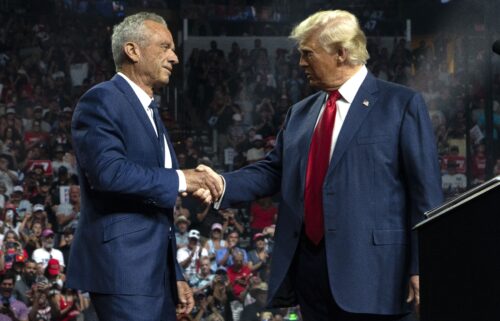Fact check: Afghans coming to US are not ‘unvetted refugees’
By Tara Subramaniam and Holmes Lybrand, CNN
On Monday, the last American military planes left Afghanistan, bringing weeks of evacuations to a close and raising questions about what’s next for thousands of Afghans the US helped evacuate.
In the days and weeks leading up to the withdrawal deadline, a number of Republicans and conservative media outlets raised concerns that Afghans are coming to the US without first being vetted.
Republican politicians, including former President Donald Trump, Sen. Ron Johnson and Senate-hopeful JD Vance (author of the popular book “Hillbilly Elegy”), have argued that the Afghans leaving the country have not been properly vetted and implied they may be a danger to the US.
In a press release last week, Trump said, “we can only imagine how many thousands of terrorists have been airlifted out of Afghanistan and into neighborhoods around the world” adding there is “NO VETTING.”
On Newsmax, a right-wing outlet, Vance asked the rhetorical question “When did we ever promise that we would bring tens of thousands of unvetted refugees into this country?”
“Because I wasn’t aware of that promise,” he added.
Even after the deadly terrorist attack at the Kabul airport, some continued to spread misinformation about the refugees. Republican Sen. Ted Cruz, for example, suggested the Biden administration was inviting terrorism by bringing unvetted Afghans into the US.
Cruz claimed insufficient vetting “is an invitation to terrorist attacks here in the United States,” telling reporters Friday, “I’m very concerned that the Biden administration is bringing tens of thousands of refugees into the United States without thoroughly vetting them.”
Facts First: It’s misleading to suggest that Afghan refugees who are coming to the US following the Taliban’s takeover are not being vetted. Intelligence, law enforcement, and counterterrorism professionals are conducting security screenings for all Afghans permitted to enter the US. And according to officials and experts, evacuated Afghans are being vetted sometimes more than once — both before leaving Afghanistan and in transit countries where they’re taken ahead of arriving in the US.
Concerns about vetting may have been prompted by reports that on the second day of evacuations, thousands of Afghans with “no documentation” were present at Hamid Karzai International Airport in Kabul.
However, State Department officials clarified that airport entry was being restricted. Measures were also in place to confirm all those arriving in the US are eligible and cleared to do so.
President Joe Biden emphasized Sunday that “Anyone arriving in the United States will have undergone a background check.”
According to national security adviser Jake Sullivan, that background check includes both biographic information and biometric vetting, such as voiceprints, iris scans, palm prints and facial photos.
“We are running biometric and biographic background checks on Afghan evacuees before bringing them to the United States,” Sullivan said Monday.
“Everyone is being vetted at some point, at least once or twice,” an administration official previously told CNN.
RELATED: Here’s how Afghan refugees coming to the US are being vetted
There’s evidence the systems are working as intended. In Qatar, one of the intermediate stops where Afghans are additionally screened before being allowed to fly to the US, at least one Afghan who may have ties to ISIS was flagged, Defense One reported last week. And according to the Pentagon, 52 of the approximately 7,000 evacuees from Afghanistan processed in Europe were flagged for further security screening, but all were ultimately cleared.
Though some Afghans have arrived in the US without proper paperwork, they’re still being vetted, but the lack of paperwork is causing delays. CNN reported some Afghan nationals were stuck in Washington Dulles International Airport for eight to 12 hours after their evacuation flight landed as US Customs and Border Protection officers processed and screened the evacuees. For those without visas, CBP has the authority to grant parole for Afghans to enter the US on a case by case basis, which the US has previously allowed during other evacuations.
Once the Afghans have been fully screened and processed, they’re transferred to military bases including Fort Lee in Virginia, Fort McCoy in Wisconsin, Fort Bliss in Texas and Joint Base McGuire-Dix-Lakehurst in New Jersey.
Adam Bates, policy counsel for the International Refugee Assistance Project, which represents Special Immigrant Visa (SIV) applicants and refugees, dismissed concerns about a lack of vetting as “uninformed or made in bad faith.”
“Thousands of Afghan allies are urgently trying to save themselves and their families; they shouldn’t have to worry about unfounded smears from demagoguing politicians too,” Bates said.
Special Immigrant Visas
Recent discussions about evacuation have centered predominantly on the SIV program, which is meant to provide a pathway to the United States for Afghans who were employed by or worked on behalf of the US government.
Sunil Varghese, policy director at IRAP, told CNN that SIV applicants often “had to already be vetted just to get that job and serve.”
SIV applicants must meet certain employment qualifications and provide supporting documents, including proof of employment and a letter of recommendation.
“Most SIV applicants have been in the process for years and gone through many layers of vetting,” Bates said, “even if they haven’t yet received a visa due to delays in the program.”
State Department spokesman Ned Price said last week that “When it comes to SIVs, again, all of those who have received instructions to come to the airport have already completed certain stages of the security vetting process.”
Most SIV applicants are also not coming to the US directly from Afghanistan. In addition to being vetted before boarding an evacuation flight, they are processed and screened once they land at an intermediate location such as Kuwait or Qatar before coming to the US.
“In many cases, they’re then taken to a third country, where they will undergo more rigorous vetting if it hasn’t yet been completed,” Price said.
The-CNN-Wire
™ & © 2021 Cable News Network, Inc., a WarnerMedia Company. All rights reserved.

